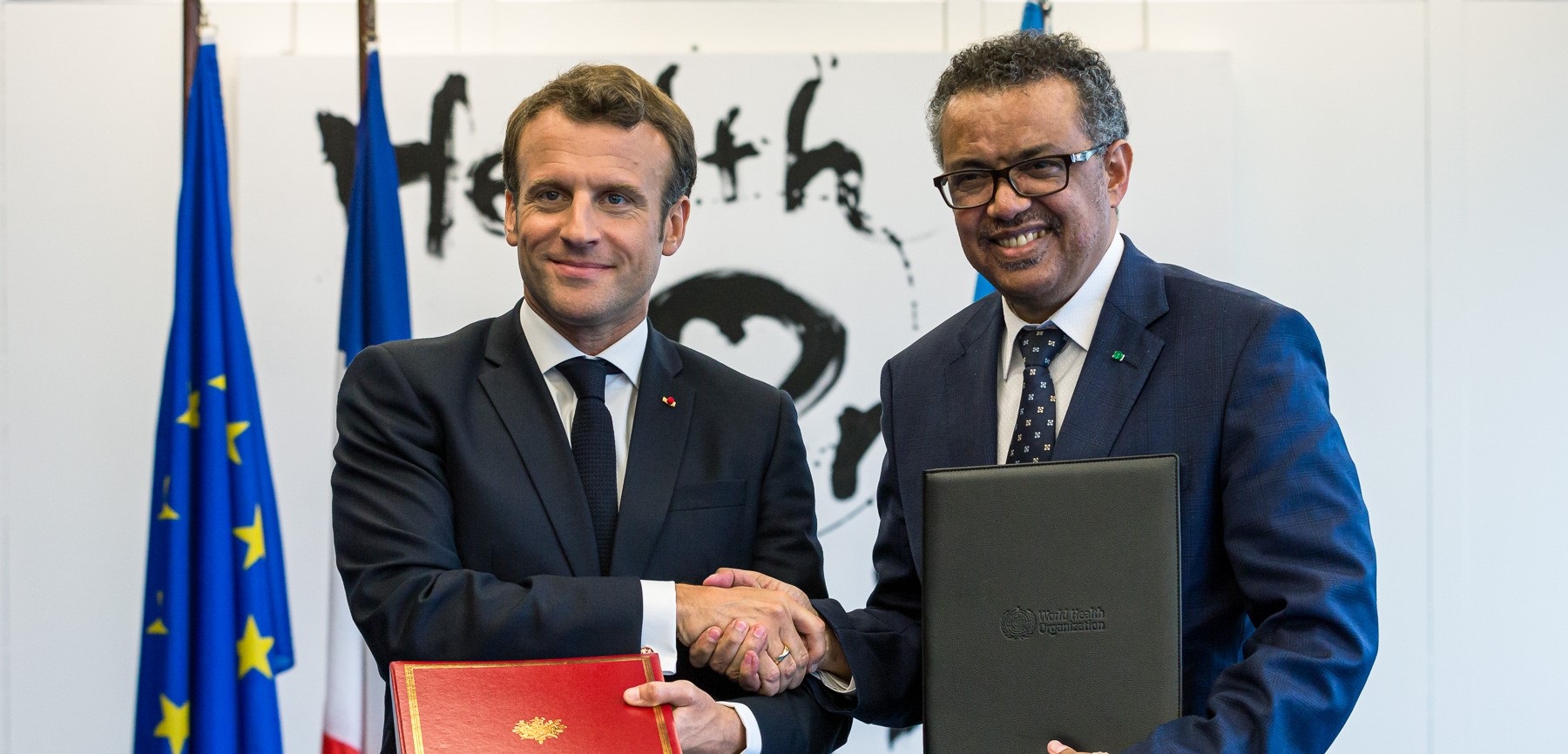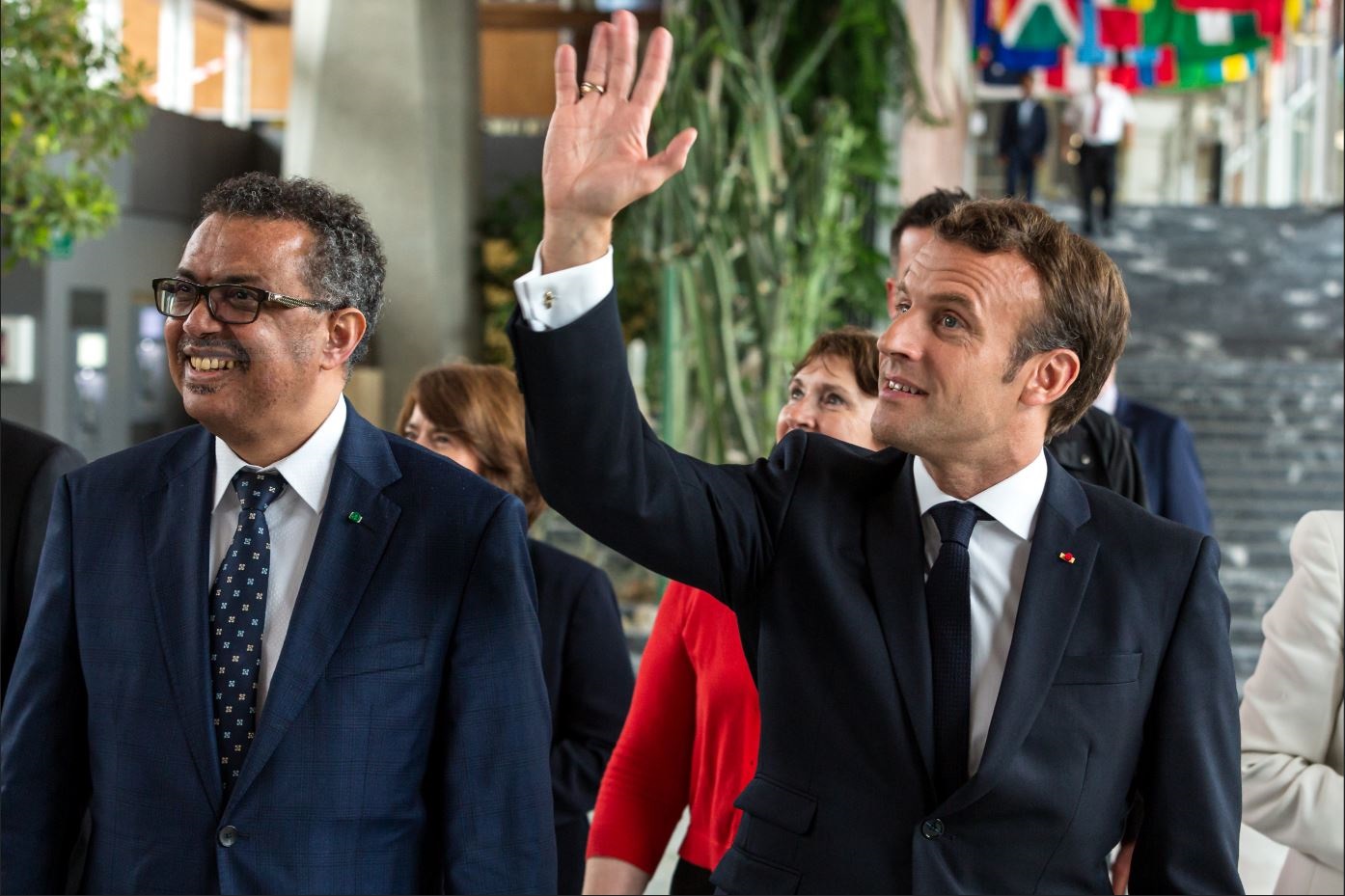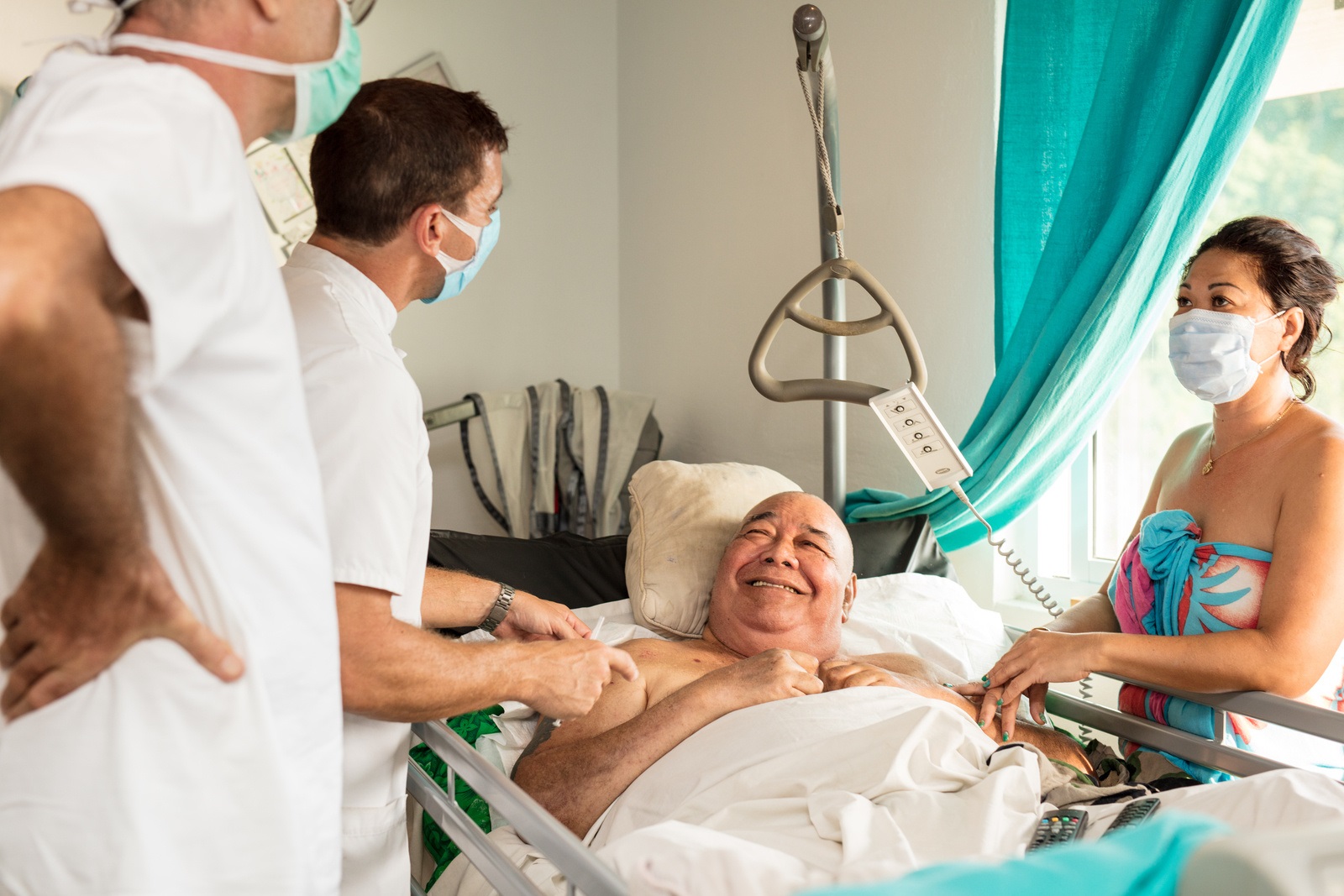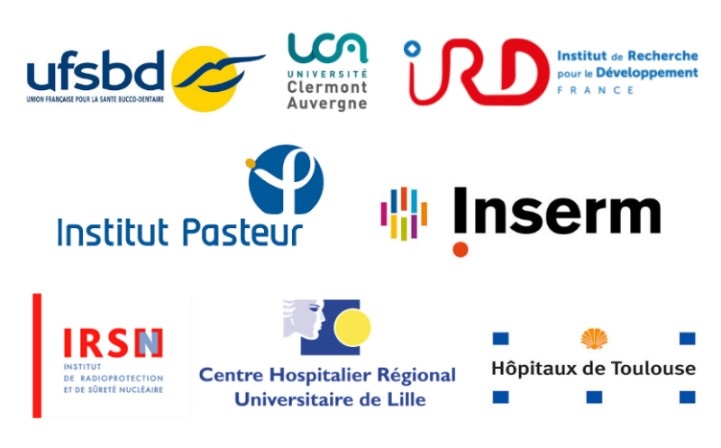- Home/
- About WHO/
- Funding/
- Our contributors/
- France

France
Partner in global health
This content is last updated on 26 May 2023.
Innovating health solutions and a shared vision: healthy lives and well-being for all people of all ages
WHO is proud of its long and fruitful partnership with France. France shares key health priorities with WHO, adopting a crosscutting approach and prioritizing universal health coverage (UHC) as part of the 2030 Sustainable Development Agenda.
France also spearheads innovative programmes such as the WHO Academy, that aim to help WHO achieve its ambitious triple billion goal by 2023: 1 billion more people will benefit from universal health coverage; 1 billion more will be better protected in health emergencies, and 1 billion more will enjoy improved health and well-being.
In January 2020, France and WHO signed a new Framework Agreement for the period 2020-2025, confirming France’s engagement and role as a key actor in global health—as well as its strong support to the ambitions of the Thirteenth WHO General Programme of Work to ensure healthy lives and well-being for all ages.

Emmanuel Macron, President of the French Republic and Dr Tedros Adhanom Ghebreyesus, WHO Director-General signed a Declaration of Intent to establish the WHO Academy.
France: Moving towards flexible financing
WHO is proud to work in partnership with the Republic of France, which contributed over US$141 million in 2020-2021, nearly half of them (43%) fully flexible and thematic funds. Flexible funds allow WHO to assign resources when and where they are needed by ensuring that less well-funded activities benefit from a better flow of funds.
Moreover, the Framework Agreement for the period 2020-2025 ensures sustainable funding for priority programmes.
The new France-WHO Framework Agreement for 2020 to 2025 provides both a strategic framework for engagement, aligned with WHO priorities, and includes legal, administrative and financial instruments for operationalizing collaboration.
See the Core voluntary contributions account 2022 annual report.

Note: The amounts represent the revenue received by WHO for the period stated. Figures in the Budget Portal may vary, as they represent funds available net of programme support costs.

Priorities for the 2022-2023 biennium
- The WHO Academy
- Stronger health systems towards Universal Health Coverage
- Health emergencies in particular International Health Regulations and health emergencies preparedness
- Reducing health inequalities
Technical highlights
The WHO Academy: Transforming life-long learning for health impact
France's generous support and guidance has been the driving force in the development of the WHO Academy, which aims to expand access to life-long learning for millions of learners who are working to improve health in their communities. From its headquarters in Lyon, the Academy will use state-of-the-art learning technologies and innovations to make the highest quality learning available to health workers, public health practitioners and policy-makers worldwide. The facility will also feature a world class health emergencies simulation centre and collaboration spaces for learning co-design, research and innovation.
On 27 September 2021, H.E. Emmanuel Macron, President of the French Republic, and Dr Tedros Adhanom Ghebreyesus, Director-General of WHO, met in Lyon for a ceremony to inaugurate the construction of the WHO Academy building, which will stand in the heart of Lyon's bio-medical district.
Stronger health systems towards Universal Health Coverage
France supports the strengthening health systems to achieve Universal Health Coverage, with particular emphasis on:
- Strengthening primary health care
- Human resources for health
- Financing of health systems
- Access to high-quality, safe, effective and affordable health products
- Research and innovation in health and patient safety
- Governance of health systems
- Health democracy
France also contributes to the Universal Health Coverage Partnership, which is one of WHO’s largest initiatives for international cooperation for universal health coverage and primary health care. It helps deliver WHO support and technical expertise to 115 countries and growing.

Health emergencies
France is a leader in global health security. Through its support to WHO, France seeks to achieve better protection of populations from health emergencies, particularly though the reinforcement of health security, including control of epidemic outbreaks and potential pandemic diseases and the implementation of the International Health Regulations (IHR). These are carried out through the activities of the WHO Lyon Office, which collaborates with WHO country and regional offices to assist Member States in strengthening their national surveillance and response systems to better detect, assess, notify on events and respond to public health risks and emergencies of international concern under the IHR. Since its establishment in February 2001, the Office has supported responses to epidemics and pandemics, ranging from Ebola, to SARS, H1N1 and most recently, COVID-19, to among many others.
Reinforcing health systems to combat COVID-19
Since the start of the COVID-19 pandemic, the Government of France has worked side by side with WHO to support implementation of the COVID-19 Strategic Preparedness and Response Plan (SPRP) and the Access to COVID-19 Tools Accelerator (ACT-A), a unique partnership that brings together health organizations, scientists, businesses, civil society and philanthropists to accelerate the development, production and equitable access to COVID-19 tests, treatments and vaccines.
In addition to this support, in February 2022, France announced a new €50 million contribution in support of countries' health systems to overcome bottlenecks in the COVID-19 response and speed up equitable access to testing, treatments and vaccines.
The funding agreement, disclosed on the sidelines of the ministerial conference of foreign ministers and health ministers in Lyon, France, aims to support the work of WHO and work in the Health Systems and Response Connector (HSRC) of the ACT-A, aligned with the WHO's COVID-19 SPRP.
Global Action Plan for healthy lives and well-being for all (SDG3 GAP)

Improved health and well-being for vulnerable populations particularly through prevention, health promotion, education for health, health literacy and reduction of risk factors, in connection with noncommunicable diseases and the environmental determinants of health; the health-related Sustainable Development Goals (SDGs) following the 2030 Agenda for Sustainable Development, including the SDG3 GAP.
France supports WHO’s core function of providing global leadership on health, engaging in partnerships where joint action is needed. The SDG3 GAP was launched at the 2019 UN General Assembly. It highlights the essential role of health for the achievement of all SDGs, and is a historic commitment now being implemented by 13 multilateral agencies. WHO will continue to provide leadership and work with partners to scale up country-level implementation of the SDG3 GAP to support countries in sustaining progress on the health-related SDGs in the context of the prolonged COVID-19 pandemic.
The SDG3 GAP and strengthened partnerships constitute a crucial asset at a time when countries are striving to protect health gains achieved so far, and to build back better from the COVID-19 pandemic with more resilient health systems centred around primary health care, re-doubling efforts to achieve health and well-being for all.
WHO Collaborating Centres in France
WHO has a long history of partnering with French experts through WHO collaborating centers in France. As of January 2021, the country is hosting 19 WHO collaborating centers, 7 of which are hosted by Institut Pasteur and its network. These centers contribute invaluable expertise to WHO on topics such as viral vaccines, bacterial infections, antibiotic resistance and mental health.
At the Institut Pasteur, the Department of Infection and Epidemiology hosts the WHO Collaborating Centre for Typing and Antibiotic Resistance of Salmonella, while the Department of Biology of Infection hosts WHO Collaborating Centre for Listeria. Both centres assist WHO in supporting its Member States to control and reduce the burden of foodborne diseases with their specific focus areas. Since the first designation in 1965, the Unité de Recherche et d'Expertise des Bactéries Pathogènes Entériques has continuously been assisting WHO in the areas of food safety and infection control. It has recently extended its support on antimicrobial resistance. Biologie des Infections group also plays a significant role in supporting WHO to strengthen the detection, control and prevention of listeriosis.

The French WHO Collaborating Centre for the Family of International Classifications (WHO-FIC) is an alliance of several public bodies using WHO-FIC for national use cases.
Under the Agence du Numérique en Santé (ANS) leadership, the centre includes: the Centre d’épidémiologie& sur les causes médicales de Décès (CépiDC), the Agence technique de l'information sur l'hospitalisation (ATIH), the Caisse nationale d’assurance maladie (CNAM), the École des hautes études en santé publique (EHESP) and the Institut national de la santé et de la recherche médicale (Inserm)/Orphanet.
The current organization allows a full coverage of the WHO-FIC use cases in France: morbidity, mortality, e-health (electronic health records and interoperability). The Centre plays an important role in maintaining, implementing and translating into French the International Statistical Classification of Diseases and Related Health Problems (ICD), the International Classification of Functioning, Disability and Health (ICF), and the International Classification of Health Intervention (ICHI).
From 1967 to 2021 the French WHO Collaborating Centre for the Family of International Classifications (WHO-FIC) was hosted by the Centre d’épidémiologie sur les causes médicales de Décès (CépiDC) in the Institut National de la Santé et de la Recherche Médicale (Inserm).
France and WHO on social media
Merci beaucoup President @EmmanuelMacron for your warm welcome in Paris, and a very constructive discussion on #COVID19 and how to end the pandemic. @WHO appreciates 🇫🇷's commitment to #VaccinEquity and protecting the most vulnerable, and support for the @ACTAccelerator. pic.twitter.com/PU2nySQRbt
— Tedros Adhanom Ghebreyesus (@DrTedros) July 18, 2022
Grateful for a good meeting with @CZacharopoulou, @francediplo Secretary of State, about strengthening global health architecture & @WHO's role in it. I thanked her for 🇫🇷's support for @ACTAccelerator, esp. for strengthening primary health care & promoting gender equality. pic.twitter.com/eSmi9Pm43A
— Tedros Adhanom Ghebreyesus (@DrTedros) July 18, 2022
Health Minister @FrcsBraun and I also discussed the #WHOAcademy and the importance of investing in training the worldwide health workforce. I thanked him for #France’s strong support to @WHO and global health security. https://t.co/klatFECVWu pic.twitter.com/lG4LPZbC4D
— Tedros Adhanom Ghebreyesus (@DrTedros) July 18, 2022
We also discussed the upcoming launch of the #WHOAcademy in Lyon. The Academy will be a game changer in boosting health knowledge & skills to help equip countries with highly trained healthcare professionals. 🇫🇷's partnership on this has been vital. https://t.co/0LW9JbO2A0
— Tedros Adhanom Ghebreyesus (@DrTedros) September 15, 2021
As #COVID19 continues to reveal inequities globally, the 🌐 commitment to health as a human right will determine how our economies & societies will recover & support everyone.
— World Health Organization (WHO) (@WHO) July 23, 2021
How #PrimaryHealthCare accelerates #HealthforAll 👉https://t.co/PYSjgi3F5i pic.twitter.com/IiDhYmndWb
An honour to sign this agreement with #France 🇫🇷 on strengthening our collaboration on important shared priorities. My thanks to Minister @JY_LeDrian & Director Fabien Penone, @francediplo_EN; @agnesbuzyn, Minister of Health; @VidalFrederique, Minister @sup_recherche. https://t.co/vfEZX5VgdQ
— Tedros Adhanom Ghebreyesus (@DrTedros) January 20, 2020
